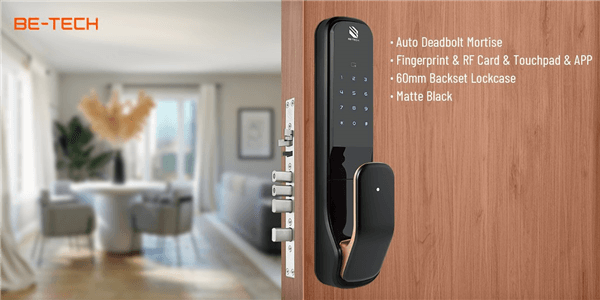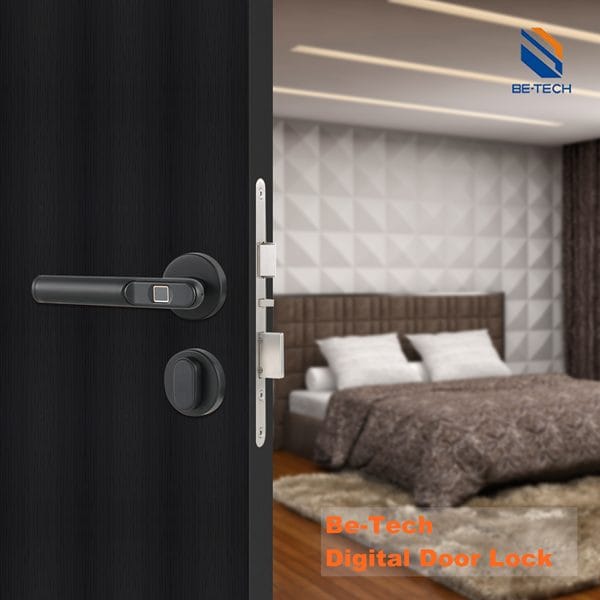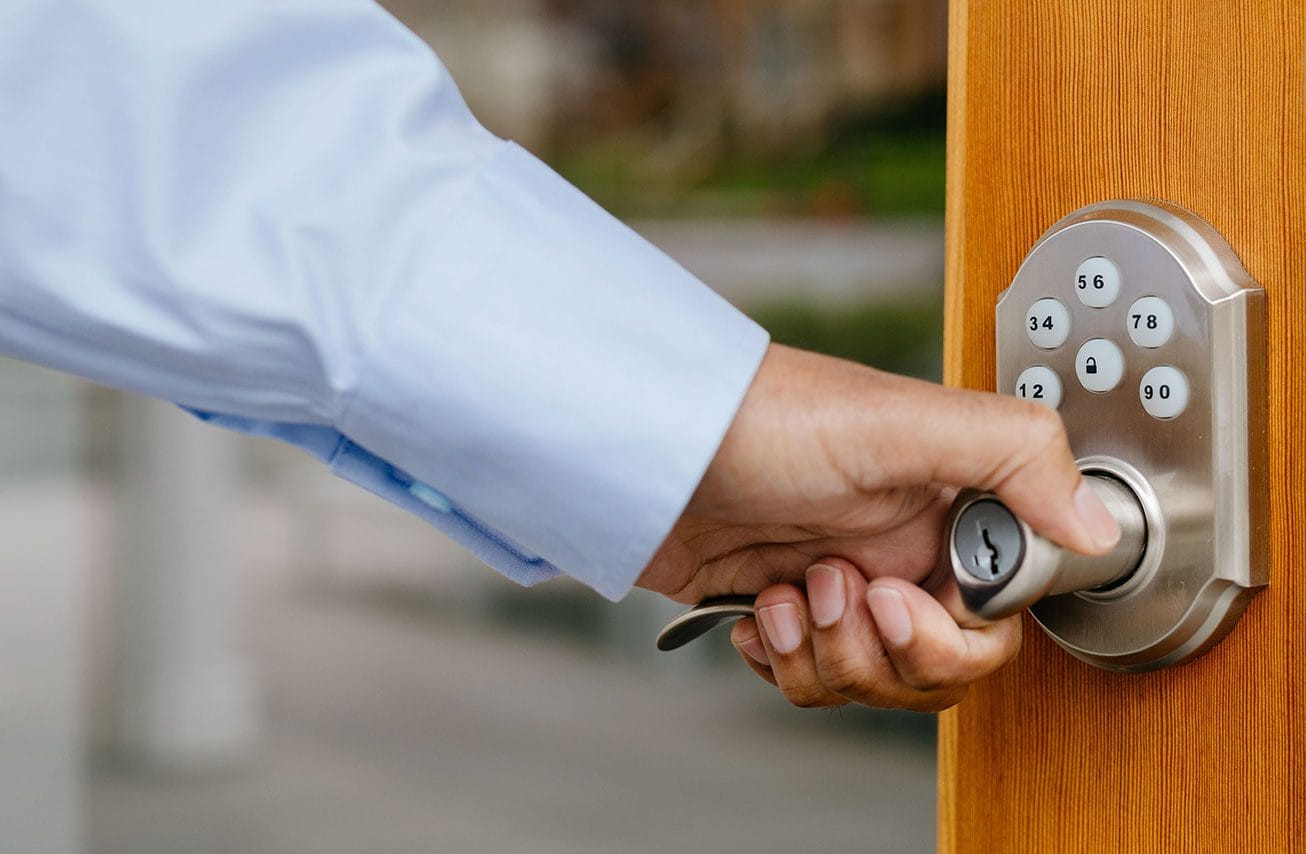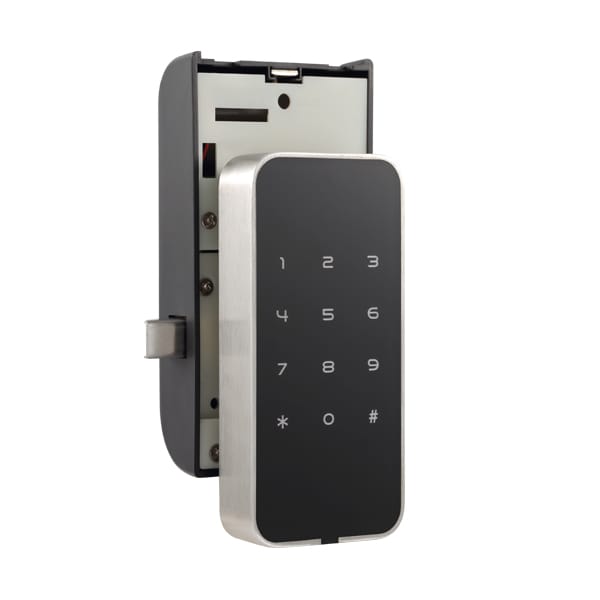In today’s world, where security concerns are paramount, homeowners are increasingly turning to advanced technology to protect their families and belongings. Be-tech, a leading innovator in the smart lock industry, offers a solution that combines the robust security of hotel-grade locks with the convenience and style demanded by modern homeowners. This article explores how Be-tech’s hotel-grade smart locks are revolutionizing home security, providing peace of mind without compromising on aesthetics.
The Evolution of Home Security
Traditional door locks have long been the first line of defense for homes. However, with a burglary occurring every 25.7 seconds in the United States, according to recent FBI reports, it’s clear that conventional locks are no longer sufficient. This alarming statistic has spurred a rapid evolution in home security technology, with smart locks emerging as a game-changing solution.

Why Hotel-Grade Locks for Homes?
Hotel-grade locks have set the standard for security in the hospitality industry for years. Now, Be-tech is bringing this level of protection to residential properties. Here’s why hotel-grade smart locks are becoming the go-to choice for security-conscious homeowners:
- Enhanced Security Features: Be-tech’s smart locks incorporate advanced anti-pick technology, drill-resistant materials, and bump-proof mechanisms, making them significantly more secure than traditional locks.
- Keyless Convenience: Say goodbye to lost keys and lockouts. Be-tech’s smart locks offer multiple access methods, including biometric scanners, RFID cards, and smartphone apps.
- Remote Access Control: Manage your home’s security from anywhere in the world using Be-tech’s intuitive smartphone app.
- Integration with Smart Home Systems: Be-tech’s locks seamlessly integrate with popular smart home platforms, enhancing overall home automation and security.
Be-tech’s Smart Lock Solutions
Be-tech offers a range of smart lock models designed to meet diverse security needs and aesthetic preferences. Let’s explore some of their flagship products:
Be-tech Sentinel Pro
The Sentinel Pro is Be-tech’s top-of-the-line smart lock, featuring:
- Biometric fingerprint scanner
- RFID card reader
- Bluetooth connectivity for smartphone access
- Tamper alarm and forced entry detection
- ANSI/BHMA Grade 1 certification
Be-tech Guardian Series

The Guardian Series caters to homeowners looking for a blend of traditional aesthetics and modern security:
- Sleek touchscreen keypad
- Key override option
- Z-Wave compatibility for smart home integration
- Available in multiple finishes to match any décor
Be-tech EasyAccess
Designed for rental properties and Airbnb hosts, the EasyAccess model offers:
- Time-limited access codes for guests
- Automatic code generation and revocation
- Integration with popular property management platforms
- Weather-resistant construction for outdoor installation
The Technology Behind Be-tech’s Smart Locks
Be-tech’s commitment to innovation is evident in the cutting-edge technology powering their smart locks:
Advanced Encryption
All Be-tech smart locks use AES 256-bit encryption, the same level of security used by banks and government agencies, to protect against digital threats.
AI-Powered Security
Be-tech’s proprietary AI algorithms continuously learn from usage patterns, enhancing security by detecting unusual activity and potential break-in attempts.
Long-lasting Battery Life
Equipped with energy-efficient components, Be-tech’s smart locks can operate for up to 12 months on a single set of batteries, with low-battery alerts sent directly to your smartphone.
Installation and Compatibility
One of the key advantages of Be-tech’s smart locks is their ease of installation. Most models are designed to replace existing deadbolts with minimal modification, making them suitable for both homeowners and renters.
Compatibility with Door Types
Be-tech offers solutions for various door types:
- Standard single and double doors
- Sliding doors
- French doors
- Garage doors
Smart Home Ecosystem Integration
Be-tech’s smart locks are designed to work seamlessly with popular smart home platforms:
- Amazon Alexa
- Google Home
- Apple HomeKit
- Samsung SmartThings
This integration allows for voice-controlled locking and unlocking, as well as the creation of complex automation routines involving other smart home devices.
Enhancing Home Security with Be-tech
Implementing Be-tech’s smart locks as part of a comprehensive home security strategy can significantly reduce the risk of break-ins and unauthorized access. Here are some best practices for maximizing the benefits of your Be-tech smart lock:
- Regular Software Updates: Keep your lock’s firmware up-to-date to ensure you have the latest security features and bug fixes.
- Multi-factor Authentication: Utilize multiple access methods (e.g., fingerprint + PIN) for critical entry points.
- Access Log Monitoring: Regularly review the access logs through the Be-tech app to detect any suspicious activity.
- Custom User Profiles: Create individual profiles for family members and service providers with tailored access permissions.
- Integration with Security Cameras: Pair your Be-tech smart lock with compatible security cameras for a comprehensive security solution.
The Aesthetic Appeal of Be-tech Smart Locks
While security is paramount, Be-tech understands the importance of style in home design. Their smart locks are available in a range of finishes and designs to complement any architectural style:
- Sleek brushed nickel for modern homes
- Classic oil-rubbed bronze for traditional aesthetics
- Polished brass for a touch of luxury
- Matte black for a contemporary edge
Cost Considerations and ROI
Investing in a Be-tech smart lock may have a higher upfront cost compared to traditional locks, but the long-term benefits often outweigh the initial investment:
- Reduced Insurance Premiums: Many insurance companies offer discounts for homes equipped with smart security devices.
- Energy Savings: Integration with smart home systems can lead to more efficient energy use.
- Increased Property Value: Smart home features, including advanced security, can boost your home’s resale value.
Future-Proofing Your Home Security
As technology continues to evolve, Be-tech remains at the forefront of smart lock innovation. By choosing a Be-tech smart lock, homeowners are investing in a future-proof security solution that can adapt to emerging threats and technologies through regular software updates and modular hardware designs.
Conclusion: Securing Your Future with Be-tech
In an age where digital and physical security threats are ever-present, Be-tech’s hotel-grade smart locks offer a powerful solution for homeowners seeking to protect their property and loved ones. By combining advanced security features with user-friendly interfaces and stylish designs, Be-tech is setting a new standard for home security.
Don’t compromise on the safety of your home. Explore Be-tech’s range of smart locks today and take the first step towards a more secure, convenient, and stylish living space. Visit Be-tech’s website or contact a local authorized dealer to find the perfect smart lock solution for your home.








